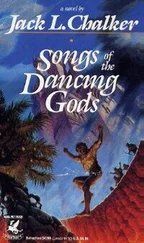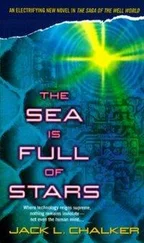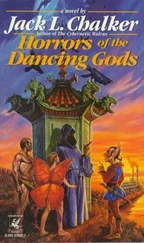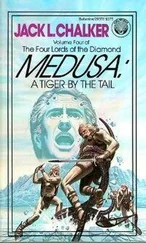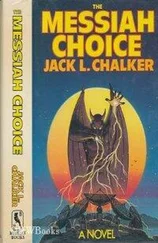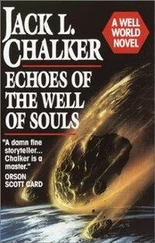She said nothing, but there were huge tears in her eyes at hearing this. She hoped it was true, that it wasn’t being embellished for her benefit. But, then, she told herself, it was exactly what he would do under the circumstances.
“After the battle,” Marquoz continued, “I managed to get together with Gypsy, who’d changed form to avoid being captured, and we tried using Brazil’s old body as the final ploy. It looked like it worked—they cheered and celebrated, and the fighting stopped pretty well up and down the line. Still, the force that broke through didn’t stop and turn around; we figured Sangh wasn’t totally buying. We fooled him too many times before. He’s going to make sure this time. He’s coming all the way up the Avenue.”
“I decided to scout up ahead of them and see if I could locate you,” Gypsy added. “It wasn’t long before I came on Ortega’s group settling in here, and I decided to find out what was what. When I learned that he wasn’t here to capture you, and that you hadn’t been seen, I got back to Marquoz, and with the aid of one of those trublaks he’s got, we were able to get him up here to assess the situation.”
“You took a chance,” Brazil noted. “You couldn’t be sure of Serge’s intentions. He has a history of being devious.”
Marquoz only shrugged. “It didn’t really matter any more. The end of the game was up here, not back there. I’d done all I could. And, if there were any tricks, maybe Gypsy and I could do something about them. It worked out, anyway.”
“Yes, it worked out—somehow,” Brazil agreed. “It always seems to. It’s part of the system. The probabilities, no matter how impossible, always break for me when my survival is at stake.” He paused a moment, then continued.
“Serge, how many people you got here? I mean all told, except for us?”
“Sixty-four,” he replied. “We had to travel fast and light and I was cashing in I.O.U.s as I went on a target of opportunity basis. Got a lot of good equipment, but not much else. They’re all good people, though, Nate, and the position’s incredible.”
“Sixty-four,” Brazil repeated. “Against Gunit Sangh’s battle-hardened two thousand.”
Ortega grinned. “About even, I think. Oh, I don’t think we can hold forever, but we don’t have to. First we get you down to the bottom by crane or whatever it takes, get some food in your bellies, then you get the hell out of here. We did a sweep up and down the Avenue this morning—there won’t be any nasty surprises. We eliminated them for you.” His expression turned serious for a moment. “I had seventy-six when I started. Would have been worse if this high-tech hex didn’t abut the Avenue. You get on down there, now. We haven’t a lot of time to waste.”
Nathan Brazil looked up at the huge Ulik and cursed his inability in this animal body to express what he was feeling inside now. It was odd; until a few minutes ago, he would have sworn such emotions had died within him thousands of years before. Finally he said, “You could come with us, you know, Serge.”
“I thought about it,” he replied. “Thought about it a lot. But, now, standing here, I wouldn’t miss this for the world.” He stared hard at Brazil’s huge animal’s eyes. “I think you understand. You, of all people, should be the one to understand.”
Brazil gave an audible, long sigh. “Yeah,” he said at last. “I think I do.” He looked over at the crane. “Let’s get on the road, then.”
Serge Ortega nodded. “Good-bye, Nate. For all of it, it was fun, wasn’t it?”
“That it was,” Brazil responded a little wistfully. “That it was. So long, you old bastard. Give ’em hell.”
Ortega grinned. “Haven’t I always?”
High, towering cliffs rose from both sides of the Avenue as it made its way from the swampy lowlands up to the Equatorial Barrier. Wind whipped through the pass, creating an eerie, wavering whistle that also carried the subtle undertones of a crashing sea, although there was no sea nearby. The Avenue here was on two levels, a fairly deep center filled with crystal-blue water that allowed the summer melt to drain off, creating the Quilst swamp far to the south; the bank on either side was wide and smooth, although weather-worn and covered with a fine layer of silt and occasional rocks from the slides. It was quite a natural-looking valley except that the stream ran almost dead straight for the length of the border, more a canal than a river.
The valley ranged from twenty or more kilometers across to less than fifty here at the Borgo Pass. Large rock and mudslides had closed it in over the ages to such an extent that, from a practical standpoint, there was only two-or-three-meters clearance on the Ellerbanta side, even less on the Verion. The walls of the canyon, however, were not sheer and never less sheer than now, at the pass; craggy outcrops every ten or so meters on both sides of the narrow section made ideal emplacements and outposts.
Serge Ortega surveyed the scene from almost ground level with some satisfaction. Things were getting set up pretty good; as darkness fell there was little left to do.
Marquoz walked up to him and looked around, admiringly. “It’s damned good organization,” he told the Ulik. “I’m impressed.”
Ortega turned and gave an odd half-smile. “I am always this way,” he told the Hakazit. “Even more, now, at what might be the climactic point of my life.” He settled back on his huge tail and smiled fully now, eyes looking beyond the other, toward places only he could see. “Consider the life I lived,” he reflected. “It’s been a damned full one, an important one, I think. Rebel, privateer, smuggler, soldier-of-fortune, star pilot—you name it, I’ve done or been it. Then I came here where, in a very short time, I became a politician, then ambassador, statesman, and, ah, world-coordinator. I’ve romanced thousands, drank, fought, generally had one hell of a good time doing it all, too. Now I’m tired and I’m bored. The only thing I haven’t done is die.”
“You picked a hell of an exit,” the Hakazit noted good-naturedly.
“Hah! Think I could end a life like mine rotting away in some retirement home? A nice, peaceful death propped up by some nurses so I could gaze lovingly at the stars? Bullshit on that! No, sir! Never! When I go out it’ll be like Asam. They’ll make up songs about me for generations. The bards will tell the tales by firelight and my enemies and their children and their children’s children shall drink toasts to my glorious memory!”
“And use your memory to scare hundreds of races’ children into being good little kiddies,” Marquoz cracked. “Hell, man, you’ve been around so long they won’t believe you’re dead when they see your body.”
Ortega considered it. “That would take the cake, wouldn’t it, now? Marquoz, I want you to pass the word. When I go, they’re to burn my body beyond recognition, beyond any hope of even identifying what sort of creature I was. I want nothing of me left. That’ll scare the hell out of the bastards for two generations.”
The Hakazit chuckled. “It’ll be done,” he assured the other. He looked out and down the dark pass. “How soon do you think we’ll have company?”
“Advance scouts and patrols any time now,” Ortega told him. “No main force until dawn, though. A fly couldn’t get through this pass at night against those heat-ray generators up there. The cliff face and slides are in our favor, too. They can’t get a clear shot at any of them without exposing themselves.”
“In fact, I would come now,” Marquoz came back. “A small force, one traveling light and with skill and silence, with a large part nocturnals and the rest with sniperscopes and computer-guided lasers. I’d do it between midnight and dawn, positioning them just so, knocking out emplacements one by one and quietly. Then I’d charge up here with everything I had at dawn.”
Читать дальше

